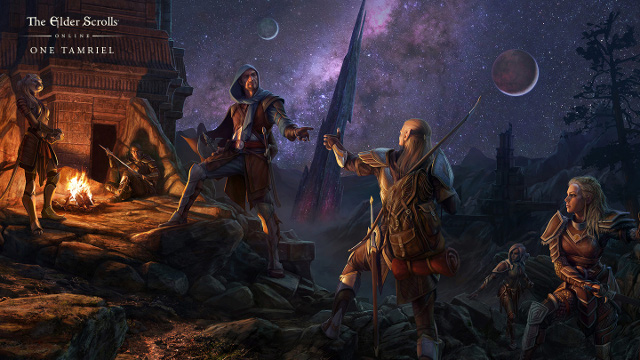I remember the first week of April 2014 like it was yesterday. I spent most of my waking hours playing what was supposed to be the next big MMORPG, one that not only belonged to a legendary IP, but was made by a studio that knew what it was doing.
When April 4th came along and I published my review of The Elder Scrolls Online, giving it a disappointing 6.5 out of 10, it goes without saying that I didn't feel great about it. As a fan of the franchise I was expecting more, and couldn't help but feel let down no matter how hard I tried to enjoy the few things it did successfully. Whether it was the long list of bugs that had the potential to outright hold quest progression, or the uncharacteristic monotony in the leveling experience, I was convinced that the game didn't stand a chance in the long run. I was wrong.
An Elder Scrolls Comeback
Two years later I would revisit The Elder Scrolls Online, encouraged by the release of what was said to be one of the most significant MMORPG patches in recent history: One Tamriel. What I came to find was that its level scaling feature alone was enough to make the experience feel a whole lot better. I was finally able to group up with friends no matter our level differences and tackle whatever content we felt like. The leveling experience instantly turned from a painful grind into a highly social adventure that I actually wanted to participate in.
The update was bolstered by a long list of smaller bug-focused patches that had released consistently over the two years prior. I was actually able to complete the quests that broke on me in 2014, and avoid other nuances that made the experience frustrating. The addition of new content to participate in was the cherry on top.

Although my early experiences made me want to tear my hair out, at this point I can confidently say that The Elder Scrolls Online is a terrific game. ZeniMax has clearly put an incredible amount of effort into post launch support, to a point where I feel the game has transformed in a way not too dissimilar from Final Fantasy XIV.
Final Fantasy Misstep
You might have heard about how bad Final Fantasy XIV was at launch. In 2010 it was nothing short of a catastrophe, earning the worst reviews of any Final Fantasy in history, and losing most of its player base within the first month. Square Enix was in trouble.
The issues were far and wide. Combat felt dated, making the long and arduous grind a deal-breaker for most players. Many game systems were also archaic, such as its slow locomotion that made travel from place to place time-consuming. Thousands of Final Fantasy fans couldn't even play the game because of its steep system requirements; only gamers with recently upgraded PC hardware could play the game reliably. My personal biggest gripe was the latency experienced during user interface interactions. Doing something as simple as selling goods or moving inventory was laggy and cumbersome unlike anything the industry had seen in years.
But just like ZeniMax, Square Enix didn't give up on the project. It might've taken three years to right the ship, but when Final Fantasy XIV: A Realm Reborn launched in August 2013, it was like playing a completely different game. Its graphics, storytelling, job system, and content were attractive enough to earn the good graces of series fans.

Here we are almost seven years later and Final Fantasy XIV is one of the best of its genre. It's received a substantial expansion pack, and a series of updates that have kept players coming back for more.
In recent years Final Fantasy XIV has retained a player base of over one million players, a huge triumph for a game that originally struggled to entertain 10,000. The Elder Scrolls Online has experienced a similar comeback, having recently claimed the throne of being the most popular MMORPG available on console. Having surpassed 8.5 million total players, it has become a financial success that Bethesda looks at as its most lucrative long-term project. Quite a turnaround, to say the least.
Conclusion
This serves as a reminder that post launch support can make a world of difference. If a developer has the time, resources, and willpower to improve a game, it can completely transform the environment over time. Final Fantasy XIV and The Elder scrolls Online are only two of many examples that should encourage developers who may experience an unsatisfactory launch.
This summer The Elder Scrolls Online will receive its first full-featured expansion, called Morrowind. It will deliver an all-new area filled with new quests and gear to acquire. Color me excited.







